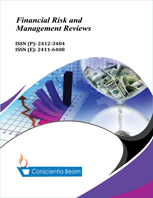Financial Risks in Turkish Banking Industry: A Panel Data Analaysis on Istanbul Stock Exchange
DOI:
https://doi.org/10.18488/journal.89.2020.61.79.87Abstract
Global price movements have been affecting markets dramatically in recent years. The changes in exchange rates, interest rates, and liquidity directly affect market value of firms. These risks are called financial risks and typically affect financial institutions. Many methods are developed to compute these risks. This study has a panel data analysis on 7 banks listed on Istanbul Stock Exchange. The motivation of this study is to investigate the relationship between financial risks (interest rate risk, exchange rate risk and liquidity risk) and market value of these banks. Many tests are available in the research such as VIF, AR Roots, Lag Length Selection Criteria, Cross Section Dependence Test, Delta Test, Unit Root Tests, Model Selection Tests, Heteroscedasticity and Autocorrelation Tests. Based on the tests, two way fixed effects model is developed. The results reveal that financial risks explain 29% of all price movements of commercial banks. The model is statistically significant. There is a positive relationship between liquidity and market value and negative relationships between interest rate risk and market value, and exchange rate risk and market value. The results are also consistent with the literature. The research is unique for the Turkish Banking industry and therefore is important academically as well as for risk management practice. Results show that banks operating in Turkey don’t properly manage financial risks. Macroeconomic dynamics and maturity mismatch problems in Turkey require great attention on financial risks. It is recommended that banks should operate with more risk management instruments such as financial derivatives and corporate risk management.

